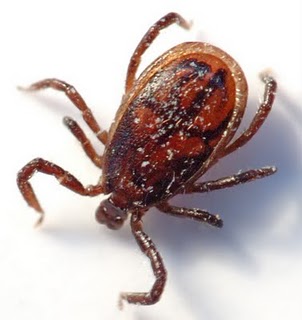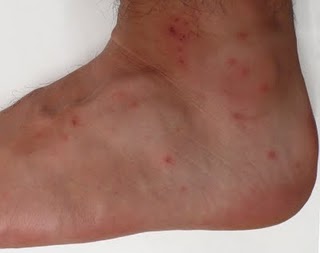
Acarology is the study of ticks and mites. During the summer, all the animal keepers become acarologists. Given the amount of time we spend outdoors we inevitably run into some of these critters.
Ticks and mites are not insects but rather arachnids, the same group of animals that contains spiders. All ticks are parasites that feed on the blood of their hosts by inserting a feeding tube through a small incision in the skin. Mites have more diverse lifestyles but many are also parasitic on animals.
The American dog tick, Dermacentor variabilis, is commonly seen in North Carolina and can carry many diseases but is not thought to be a major vector of Lyme disease. The deer tick, Ixodes scapularis, is thought to be primary vector for Lyme in the United States and the overwhelming number of cases are found in the northeastern states. Keeper Marilyn is famously afraid of ticks and goes to great lengths to avoid them. The recent reports about the neurotoxicity of DEET (the main ingredient in many bug repellents) make me think I’ll try not to stand near her until summer is over!
 Ticks don’t really bother me but I really hate getting chiggers. Like ticks, they are often found on tall grasses patiently waiting for a passing mammal. Chiggers are mites that like to feed on your skin rather than your blood, here in North Carolina we are mostly afflicted by the harvest mite, Trombicula alfreddugesi. Once on your body, the mites eject digestive enzymes on your skin and then have a meal of partially digested skin cells. If you are sensitive to the enzymes like I am, then you get a red itchy bump (see photo) wherever the mite was feeding. It is not uncommon to have several chiggers on your skin at once and they usually migrate to dark, damp areas to feed. Contrary to popular belief, the red welt only appears after the mite is gone and is NOT caused by the mite being embedded in the skin.
Ticks don’t really bother me but I really hate getting chiggers. Like ticks, they are often found on tall grasses patiently waiting for a passing mammal. Chiggers are mites that like to feed on your skin rather than your blood, here in North Carolina we are mostly afflicted by the harvest mite, Trombicula alfreddugesi. Once on your body, the mites eject digestive enzymes on your skin and then have a meal of partially digested skin cells. If you are sensitive to the enzymes like I am, then you get a red itchy bump (see photo) wherever the mite was feeding. It is not uncommon to have several chiggers on your skin at once and they usually migrate to dark, damp areas to feed. Contrary to popular belief, the red welt only appears after the mite is gone and is NOT caused by the mite being embedded in the skin.
If you want to avoid ticks and mites, try to avoid their favorite habitat, tall grass. If you have to be there, wearing long pants with your socks pulled over the outside of the pant legs can keep them from reaching your skin. Applying bug repellent along the edges of your socks can help if you are wearing shorts. Once you have been exposed to ticks and mites, give yourself a good examination for hitchhikers and take a shower or wash exposed areas.
If you have a pet, your veterinarian might suggest that you apply a flea and tick repellent to prevent the transmission of diseases that can come with their bites. Some of the animals here at the Museum get the same sort of flea and tick preventative that your vet might prescribe.
The picture of the tick totally grosses me out.
Chiggers are the worst!!! I still have a few faint scars from them attacking my feet over a year ago- worse then posion ivy!